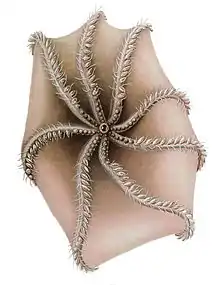| Cirrina | |
|---|---|
 | |
| Oral view of Cirrothauma murrayi showing single row of suckers and paired cirri | |
| Scientific classification | |
| Domain: | Eukaryota |
| Kingdom: | Animalia |
| Phylum: | Mollusca |
| Class: | Cephalopoda |
| Order: | Octopoda |
| Suborder: | Cirrina Grimpe, 1916 sensu Felley et al., 2001 |
| Families | |
|
Opisthoteuthidae | |
| Synonyms | |
| |
Cirrina or Cirrata is a suborder and one of the two main divisions of octopuses. Cirrate octopuses have a small, internal shell and two fins on their head, while their sister suborder Incirrina has neither. The fins of cirrate octopods are associated with a unique cartilage-like shell in a shell sac. In cross-section, the fins have distinct proximal and distal regions, both of which are covered by a thin surface sheath of muscle.
The suborder is named for small, cilia-like strands (cirri) on the arms of the octopus, a pair for each sucker. These are thought to play some role in feeding, perhaps by creating currents of water that help bring food closer to the beak. Cirrate octopuses are noteworthy for lacking ink sacs.
Phylogeny
A molecular phylogeny based on mitochondrial and nuclear DNA marker sequences by Sanchez et al., 2018, shows that the Cirrina is paraphyletic, i.e. it is not a single clade. Instead, a clade containing Opisthoteuthidae and Cirroctopodidae is sister to the Octopodida, while a clade containing Cirroteuthidae and Stauroteuthidae is sister to the clade that contains those other groups.[1] However, subsequent studies, using a greater coverage of species and genes, have found Cirrata and Incirrata to be monophyletic clades,[2] consistent with earlier morphological and molecular studies.[3][4]
Classification
The family level clades recognized within Cirrina has changed over time. Currently five families are recognized by the World Register of Marine Species (Cirroteuthidae, Stauroteuthidae, Opisthoteuthidae, Grimpoteuthidae, and Cirroctopodidae),[5] with these groups also recognized in recent molecular work.[2] The families Cirroteuthidae and Stauroteuthidae have been problematic, while they are distinct morphologically, molecular studies using mitochondrial genes revealed a single family (Stauroteuthidae being synonymized under Cirroteuthidae),[3] but more recent analysis using nuclear genes does show separation.[2] The family Grimpoteuthidae has also at times been synonymized under Opisthoteuthidae but is currently well supported.[3][6][2][7][8]
- CLASS CEPHALOPODA
- Subclass Nautiloidea: nautilus
- Subclass †Ammonoidea: ammonites
- Subclass Coleoidea
- Superorder Decapodiformes: squid, cuttlefish
- Superorder Octopodiformes
- Family †Trachyteuthididae (incertae sedis)
- Order Vampyromorphida: vampire squid
- Order Octopoda
- Genus †Keuppia (incertae sedis)
- Genus †Palaeoctopus (incertae sedis)
- Genus †Proteroctopus (incertae sedis)
- Genus †Styletoctopus (incertae sedis)
- Suborder Cirrina: finned deep-sea octopus
- Family Opisthoteuthidae (containing Opisthoteuthis)
- Family Grimpoteuthidae (containing Grimpoteuthis, Cryptoteuthis, & Luteuthis)
- Family Cirroctopodidae (containing Cirroctopus)
- Family Cirroteuthidae (containing Cirroteuthis, & Cirrothauma)
- Family Stauroteuthidae (containing Stauroteuthis)
- Family uncertain: †Paleocirroteuthis[9]
- Suborder Incirrina
References
- ↑ Sanchez, Gustavo; Setiamarga, Davin H. E.; Tuanapaya, Surangkana; Tongtherm, Kittichai; Winkelmann, Inger E.; Schmidbaur, Hannah; Umino, Tetsuya; Albertin, Caroline; Allcock, Louise; Perales-Raya, Catalina; Gleadall, Ian; Strugnell, Jan M.; Simakov, Oleg; Nabhitabhata, Jaruwat (2018). "Genus-level phylogeny of cephalopods using molecular markers: current status and problematic areas". PeerJ. 6: e4331. doi:10.7717/peerj.4331. PMC 5813590. PMID 29456885.
- 1 2 3 4 Taite, M.; Fernández-Álvarez, F. Á.; Braid, H. E.; Bush, S. L.; Bolstad, K.; Drewery, J.; Mills, S.; Strugnell, J. M.; Vecchione, M.; Villanueva, R.; Voight, J. R.; Allcock, A. L. (2023-02-10). "Genome skimming elucidates the evolutionary history of OctopodA". Molecular Phylogenetics and Evolution. 182: 107729. doi:10.1016/j.ympev.2023.107729. hdl:10261/329953. ISSN 1055-7903. PMID 36773750. S2CID 256804597.
- 1 2 3 Piertney, Stuart B.; Hudelot, Cendrine; Hochberg, F. G.; Collins, Martin A. (2003-05-01). "Phylogenetic relationships among cirrate octopods (Mollusca: Cephalopoda) resolved using mitochondrial 16S ribosomal DNA sequences". Molecular Phylogenetics and Evolution. 27 (2): 348–353. doi:10.1016/S1055-7903(02)00420-7. ISSN 1055-7903. PMID 12695097.
- ↑ Lindgren, Annie R.; Pankey, Molly S.; Hochberg, Frederick G.; Oakley, Todd H. (2012-07-28). "A multi-gene phylogeny of Cephalopoda supports convergent morphological evolution in association with multiple habitat shifts in the marine environment". BMC Evolutionary Biology. 12 (1): 129. doi:10.1186/1471-2148-12-129. ISSN 1471-2148. PMC 3733422. PMID 22839506.
- ↑ "WoRMS - World Register of Marine Species - Cirrata". www.marinespecies.org. Retrieved 2023-06-24.
- ↑ Gibson, R; Atkinson, R; Gordon, J, eds. (2006-06-13). Oceanography and Marine Biology: An Annual Review, Volume 44. Oceanography and Marine Biology - An Annual Review. CRC Press. doi:10.1201/9781420006391.ch6. ISBN 978-0-8493-7044-1.
- ↑ Verhoeff, Tristan Joseph; O’Shea, Steve (2022-01-02). "New records and two new species of Grimpoteuthis (Octopoda: Cirrata: Grimpoteuthididae) from southern Australia and New Zealand". Molluscan Research. 42 (1): 4–30. doi:10.1080/13235818.2022.2035889. ISSN 1323-5818. S2CID 247020706.
- ↑ Ziegler, Alexander; Sagorny, Christina (2021-04-23). "Holistic description of new deep sea megafauna (Cephalopoda: Cirrata) using a minimally invasive approach". BMC Biology. 19 (1): 81. doi:10.1186/s12915-021-01000-9. ISSN 1741-7007. PMC 8063452. PMID 33888110.
- ↑ Tanabe, Kazushige; Trask, Pat; Ross, Rick; Hikida, Yoshinori (March 2008). "Late Cretaceous octobrachiate coleoid lower jaws from the north Pacific regions". Journal of Paleontology. 82 (2): 398–408. Bibcode:2008JPal...82..398T. doi:10.1666/07-029.1. ISSN 0022-3360. S2CID 130635916.
External links
- Cirrata at the Tree of Life Web Project
- Cirrate male reproductive tract at the Tree of Life Web Project